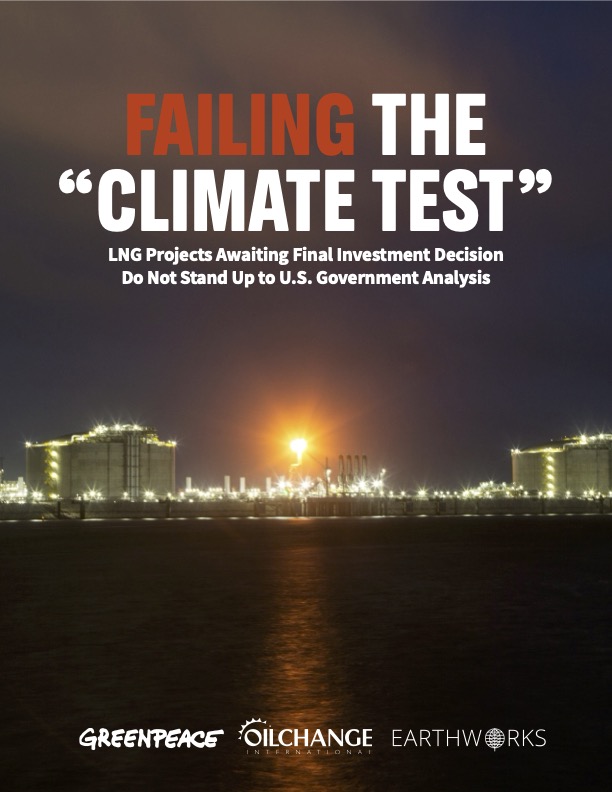
Failing the “Climate Test”: LNG Projects Awaiting Final Investment Decision Do Not Stand Up to U.S. Government Analysis
“What we found was crystal clear – any further investment in LNG is not compatible with a livable climate,” says Andres Chang, Senior Research Specialist at Greenpeace USA and lead author of the report.
Failing the “Climate Test”: LNG Projects Awaiting Final Investment Decision Do Not Stand Up to U.S. Government Analysis
As the Trump administration barrels forward with its pro-fossil fuel agenda, and European and Asian governments and financial institutions debate whether to increase investments in U.S. liquified natural gas (LNG) projects, a report published by Greenpeace USA, Earthworks, and Oil Change International highlights the climate threats and financial risks posed by five major new liquefied gas export projects proposed for the US Gulf Coast, most of them still awaiting a final investment decision. “What we found was crystal clear – any further investment in LNG is not compatible with a livable climate,” says Andres Chang, Senior Research Specialist at Greenpeace USA and lead author of the report.”
The report analyzes the five LNG projects using models from DOE’s 2024 LNG Export public interest studies and finds that each would fail a “climate test” implied by the agency. Contrary to industry claims, the report finds that decreasing methane venting and leaking during gas drilling, transportation, and liquefaction is not enough to make these projects “climate neutral.”
Key findings:
- Applying the DOE’s methodology to five planned LNG projects—Venture Global CP2, Cameron LNG Phase II, Sabine Pass Stage V, Cheniere Corpus Christi LNG Midscale 8-9, and Freeport LNG Expansion—indicates that each of them would result in a net increase in global GHG emissions regardless of the climate policy, energy demand, and technology assumptions underlying the calculation. In practical terms, all five LNG projects appear to fail a climate test that the DOE put forward to ensure approvals are consistent with the public interest.
- Sustainability measures cannot make increasing LNG exports consistent with limiting warming to 1.5ºC. Even if major steps were taken to reduce the GHG emissions associated with LNG production through liquefaction—such as gas supply basin switching, LNG terminal methane abatement, and powering liquefaction with renewable electricity—increasing LNG exports from the Gulf Coast would still lead to global GHG emissions increases that will produce dangerous levels of warming.
- Under a scenario with safer and more realistic constraints on the availability of carbon capture and storage (CCS), the climate impact of increasing LNG exports would be even greater because deeper reductions in fossil fuel production would be necessary. The DOE’s most conservative CCS assumption under a Net Zero scenario surpasses feasible scale-up rates based on historical technology analogues and results in gas sector CCS volumes five times higher than in the International Energy Agency Net Zero Emissions scenario.
- While the methodology presented in the 2024 LNG Study is a major improvement upon previous federal analyses, it still fails to sufficiently account for emissions from large, accidental releases (such as “super-emitter” events), equipment malfunction, and malpractice. High rates of methane emissions during the ocean transport stage of the LNG supply chain are also not represented. Incorporating measurement-based data and more realistic assumptions would make clearer the immense climate impact of building new LNG infrastructure, especially in the near term.
